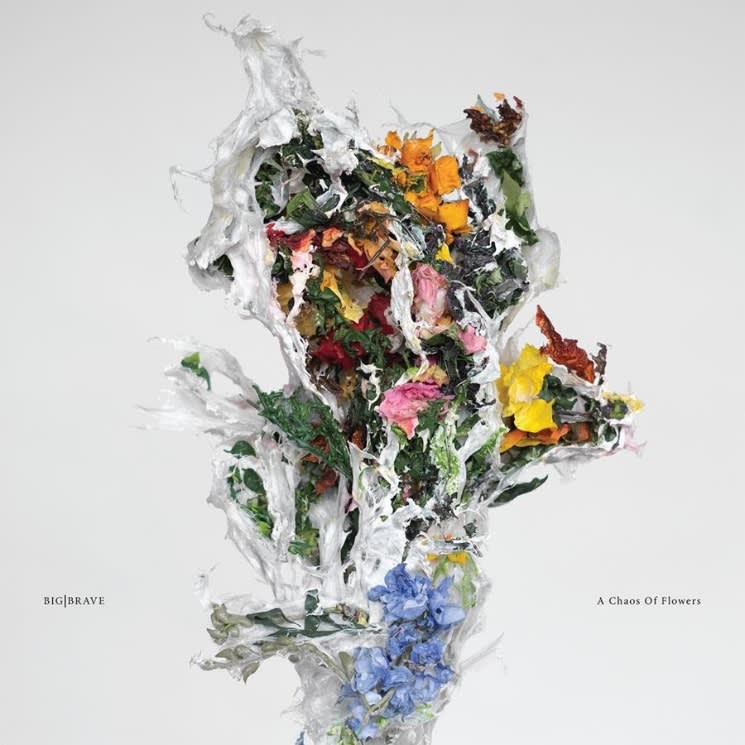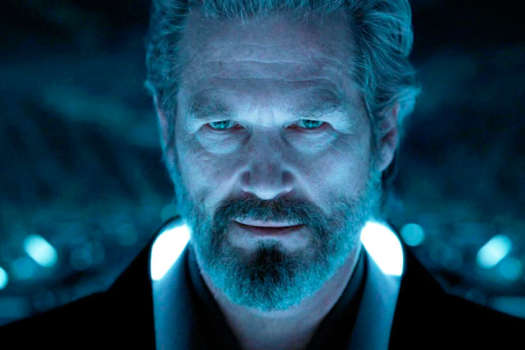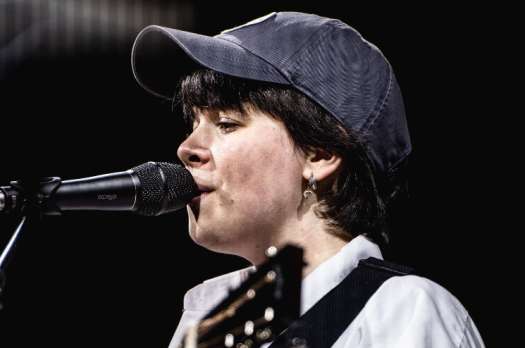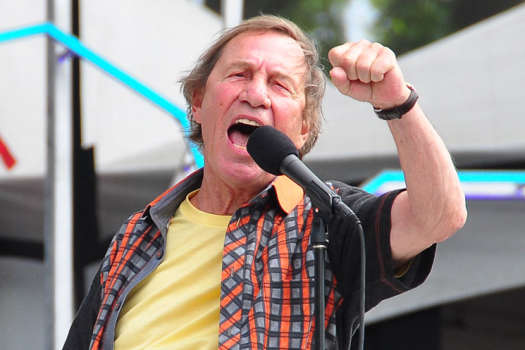There is no other band that intersects the ecstatic and the hopeless quite like BIG|BRAVE. Their songs veer between spiritual catharsis, grinding earthquakes and prolonged moments of serenity, whispered pledges that rise above the din of feedback and primordial hums.
A Chaos of Flowers is the follow-up to last year's relentlessly heavy nature morte, and although the similar album covers of alien flower bouquets suggest a kinship, it's the contrast between the two records that is most immediately apparent. Their 8th album, A Chaos of Flowers is BIG|BRAVE's most potent and beautiful to date. Vocalist and guitarist Robin Wattie dug through international poetry "across womanhood" while writing A Chaos of Flowers, rediscovering some favourite works and coming to a revelation — that all these female-identifying artists share a kinship. As Wattie puts it, "We're alone, and yet, not."
Prepared piano begins the monumental "i felt a funeral" with vocals laid bare for the opening minute before guitarist Mathieu Ball's first strum rumbles over the pastoral soundscape. Ball shows restraint hitherto unseen on a BIG|BRAVE release, focusing on tonality over tectonic gravitas. There are synthesizers on these songs, by producer Seth Manchester (Lingua Ignota, Full of Hell, the Body), but they're often intertwined so deeply with Wattie and Ball's guitars that the lines are intentionally blurred. Drummer Tasy Hudson is able to corral the chaos into organized meters.
There is a small but crucial community of guest players across these eight tracks — including guitarist Tashi Dorji, saxophonist Patrick Shiroshi and American primitive guitar player Marisa Anderson adding earthen arpeggios and textures to two tracks; "canon : in canon" is the most abjectly sorrowful piece ever composed by the band, the vocal melody withering as each guitar chord and cymbal hit crashes over it like a wave, finally burying it halfway through. But it's only momentary — soon, Wattie comes wailing back as all the instruments lock into a heartbreaking dirge, finally in support of the unearthly beauty being sung.
The tempos remain firmly sub-100BPM, even in the album's densest moments. Hudson keeps things sparse too — merely a cymbal or snare hit on each quarter or half note. It's a miracle that anyone is able to keep a tempo in music that crawls at such enormously slow speeds. There is, however, an ocean of textures found between each quarter note, and the space allows Wattie to find nuance between her now-refined howls and whispers.
Each instrument locking into the monolithic sweep has the effect of a caravan gaining members, and a community building itself up. The warmth of guitar feedback has never sounded so inviting as on the back half's gothic masterpieces "theft" and "quotidian : solemnity." On the latter, the guitars verge into an almost SUNN O)))-level of breakup, as each strum brings with it only overtones of gain-soaked grinds. Wattie begins layering her own vocals with lower octaves and digital doubles as the instruments wail higher and higher into the cosmos. It's here that the record truly becomes a call for kinship amid the chaos. Wattie's words ring out over a pandemonium of sound, competing — and ultimately winning out — with the cacophony that's attempting to bury them.
Closer "moonset" is a highlight of Anderson's blues-tinged fingerpicking, and it's the closest thing BIG|BRAVE have to a folk song here. For the first three and a half minutes, that is; Suddenly, Hudson begins a rare drum fill as the instruments begin to drone deep and dark once more. Absent now is Wattie's voice, only hints of blues guitar underneath the sonorific gloom. It's a powerful, leaden climax to the band's most ethereal outing yet. Despite electric amplifiers and a plethora of pedals, BIG|BRAVE have created an album that sounds like it's existed since the dawn of time. Tears will be shed and embraces are encouraged.




